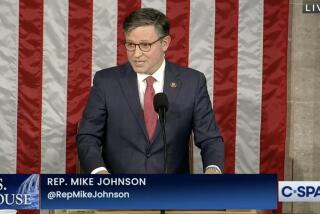Pensions on a Shaky Edge
- Share via
Here’s the nightmare envisioned by some pension experts: United Airlines, arguing that it needs to be more competitive with Jet Blue and Southwest, defaults on $5 billion in pension obligations. Other major carriers follow suit, arguing that they need to remain competitive with United. And soon automobile manufacturers and other employers saddled with high pension costs join the rush to dump their obligations. In the end, the people picking up the tab would be taxpayers and, in many cases, employees and pensioners.
It’s too soon to say what United will do with its pension obligations or whether the federal agency charged with insuring $1.5 trillion in retirement plan benefits will go bust. But there’s a reason it all sounds familiar. During the late-1980s, taxpayers were forced to pay a multibillion-dollar bailout of a federal agency that insured deposits held by the nation’s savings and loan industry.
Congress hoped to avoid this mess in 1974 when it created the Pension Benefit Guarantee Corp. to ensure that pensions got paid, without taxpayer assistance, by collecting premiums from companies that offer pensions (just as the federal agency levied premiums on S&Ls;). And even though traditional pensions are dwindling, the PBGC still insures 31,000 plans covering 44.3 million workers and retirees.
Financial pressure increased during the 1990s as steel companies -- citing competitive reasons -- defaulted on obligations, sending their pensioners to the federal insurers. A $7.7-billion PBGC surplus at the start of 2001 morphed into an $11.2-billion deficit within two years. The nation’s private pension plans were underfunded by a record $350 billion at the end of 2003 -- meaning many plans now lack assets needed to guarantee obligations. Though most companies can cut or cap pensions at any time, those with union contracts use bankruptcy court to drop them -- and shift obligations to the federal agency.
Congress can’t change some forces shaping this crisis. Pensions have grown more costly because retirees live longer, and the underfunding would shrink if the economy were growing robustly.
Congress ought to consider increasing PBGC premiums paid by employers, even though higher costs could tempt more employers to drop out of the insurance pool. Other changes would be more clearly beneficial, starting with eliminating a prohibition against pumping additional money into corporate plans during good times. The rule was seen as a way to keep companies from using pension funds as tax shelters, but hindsight suggests it makes more sense to encourage additional funding when coffers are flush. Congress should also require clearer accounting from employers so retirees, regulators and taxpayers know the real financial strength of plans. If pensions are no longer an honest promise, the truth is better than unforeseen penury.
More to Read
Inside the business of entertainment
The Wide Shot brings you news, analysis and insights on everything from streaming wars to production — and what it all means for the future.
You may occasionally receive promotional content from the Los Angeles Times.










